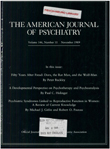The specificity versus nonspecificity dilemma: toward identifying therapeutic change agents
Abstract
The author examines the specificity versus nonspecificity dilemma that characterizes the unresolved question of how psychotherapy works. He explores different meanings and arguments on both sides of the controversy and attempts to identify three therapeutic change agents that all schools of therapy share as the basis of their different techniques: affective experiencing, cognitive mastery, and behavioral regulation. The roles and functions of these agents are discussed with regard to their potential complementarity in clinical practice.
Access content
To read the fulltext, please use one of the options below to sign in or purchase access.- Personal login
- Institutional Login
- Sign in via OpenAthens
- Register for access
-
Please login/register if you wish to pair your device and check access availability.
Not a subscriber?
PsychiatryOnline subscription options offer access to the DSM-5 library, books, journals, CME, and patient resources. This all-in-one virtual library provides psychiatrists and mental health professionals with key resources for diagnosis, treatment, research, and professional development.
Need more help? PsychiatryOnline Customer Service may be reached by emailing [email protected] or by calling 800-368-5777 (in the U.S.) or 703-907-7322 (outside the U.S.).



